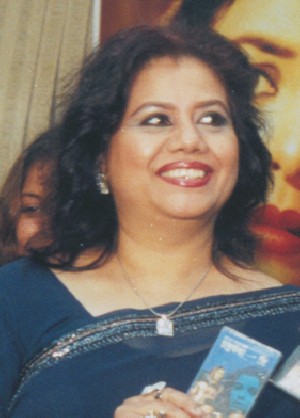|
Born in a family of music lovers
in Bangladesh, Runa started learning classical
 music at a very early age, and
received vigorous training from Ustad Habibiddin Khan. She made her first public
debut as a singer at the age of six and cut her first disc for a Pakistani film
called "Jugnu" at the age of twelve. Runa's carrier as a singer came
by accident. It was her elder sister Dina who first got the break, but on the
day of her performance, she developed a sore throat and Runa was asked to stand
in. She was so little that she could not hold the 'tanpura'. She held it
horizontally and sang a 'kheyal'. And she became an instant hit. Sister Dina
would have followed in her footsteps, but she had to give up singing when she
married. She later died of cancer. In memory of her sister, Runa held six
concerts in Bangladesh and donated the entire proceeds to a children's hospital
in Dhaka to build a cancer ward which has been named after her sister. music at a very early age, and
received vigorous training from Ustad Habibiddin Khan. She made her first public
debut as a singer at the age of six and cut her first disc for a Pakistani film
called "Jugnu" at the age of twelve. Runa's carrier as a singer came
by accident. It was her elder sister Dina who first got the break, but on the
day of her performance, she developed a sore throat and Runa was asked to stand
in. She was so little that she could not hold the 'tanpura'. She held it
horizontally and sang a 'kheyal'. And she became an instant hit. Sister Dina
would have followed in her footsteps, but she had to give up singing when she
married. She later died of cancer. In memory of her sister, Runa held six
concerts in Bangladesh and donated the entire proceeds to a children's hospital
in Dhaka to build a cancer ward which has been named after her sister.
Runa can sing in
seventeen languages. Besides her native Bengali, she is also proficient in
Hindi, Urdu, Punjabi, Sindi, Gujrati, Poshtu, Baluchi, Arabic, Persian, Malay,
Nepalese, Japanese, Italian, Spanish, French and of course in the English
language. Runa Laila has also earned wide fame for her stage and TV
performances, specially in Pakistan, where Runa Laila is considered as their
own. She has been immensely popular with film goers as well in that country. She
has had her own television series fortnightly in Pakistan called Bazme-Laila
which had been widely acclaimed by critics and audience. She appeared in the
popular Pakistan series Yes Sir - No Sir in which she proved to be able
match to Moen Akhtar, the celebrated host of the chat show.
Runa has sung and recorded well over
5000 songs to date. She will feature in the Guiness Book of Records for
recording the largest number of songs in a single day. This happened in Bombay,
where she cut four albums recording 40 songs: 30 of these in three days.
Besided being a household name in her
home country, Bangladesh, she is famous in neighboring India and Pakistan too.
She is also well known among the Asian expatriates all over the world, including
the United States, Europe and the Middle East and Far East.
In India, she is the Dama dam
girl, who almost posed a threat to the near-monopoly of the invincible singing
sisters of Lata Mangeskar and Asha Bhosle. Runa was an over-night hit when she
made a sensational entry into the Hindi filmdom with her Ek Se Badkar Ek
which she sang for the film Ek Se Badkar Ek in 1974. Music lovers all
over India were swinging to the rhythmic beat of Dama Dam Mast Qalander.
Her songs in Gharonda, which was released later, also went down very well with
Indian audience. After that she withdrew from Bombay, but still remained popular
in the south Asian country. She has since made occasional forays to the
"Hollywood of the East" to make albums, all of which turned out to be
best-sellers. Her toe-tapping "Super-Runa", which she cut for EMI
Music Company along with Bappi Lahiri, has won her gold and platinum discs. She
recorded "Loves of RUna Laila", with celebrated film music director of
Pakistan Nayyar which has gone double platinum. She has recorded in some more
Hindi films since including "Jane-Bahar", "Sapan Ka Mandir"
and the Amitabh Bachchan starred "Agni Path".
Runa has travelled to several parts of
the world to give performances. She has had concerts in North America and Canada
many times and had given recitals at the Kennedy Center in Washington and at the
Lincoln Center and Madison Square Gardens in New York. In London, Royal Albert
Hall, Wembley Arena and Wembley Conference Center have been venues for her
successful programs many times. She has also performed in many other parts of
the world, including Kuwait, UAE, Bahrain, Nepal, Malaysia, Holland, Singapore,
Hong Kong, Sweden, Oman, Doha, India and Pakistan. She has also done a lot of
charity concerts all over the world for several worthwhile causes.
During her long and distinguished
career in music, she has received around 150 awards in various countries. They
include the Saigal Award in India, Nigar Award (twice), Critics Award, Graduate
Award (twice) as well as gold medals by the National Council of Music as the
best singer of the year in Pakistan and the Independence Day Award and National
Film Award (twice) in Bangladesh.
Source: Sanskriti
Website
NOTE: The following Kashmiri song sung
by Runa Laila in mid 70s was a super-hit in Kashmir.
|
|
Title
|

|
Kati chukh nundbanay
(Lyrics:
Mahjoor)
|
|
